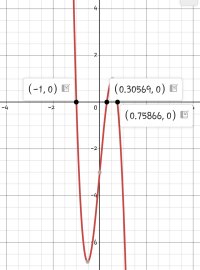thank fresh_42 very much. i think i'm understanding
op question is easy
for post number 3 i can't proof all the solutions without a computer. what if this question come in the test? can i get the answer with a casio calculator?
Tests usually do not have such complicated numbers. You would need to "guess" the solution [imath] x_0=3641456693 [/imath] which is not very likely as long as you aren't a genius.
This is a bit different in the original question in post #1. Here we had
[math] x^4-13x^3+11x-3\equiv 0\pmod{7^8} [/math]and a specific solution [imath] x=-1 [/imath] can be guessed: just test small numbers like [imath] \pm 2,\pm1,0 .[/imath] This allows us to perform a polynomial (long) division:
[math]\begin{array}{lll}
(x^4-13x^3+11x-3)\, : \,(x-(-1))=x^3 - 14 x^2 + 14 x - 3
\end{array}[/math]and we can write
[math] x^4-13x^3+11x-3=(x^3 - 14 x^2 + 14 x - 3)\cdot(x+1)\equiv 0\pmod{7^8}. [/math]This means that [imath] 7^8 [/imath] divides [imath] (x^3 - 14 x^2 + 14 x - 3)\cdot(x+1) [/imath] and thus that in particular [imath] 7 [/imath] divides [imath] (x^3 - 14 x^2 + 14 x - 3)\cdot(x+1). [/imath] Seven is prime and we have learned that if a prime divides a product, then it has to divide at least one of the factors.
Case 1: [imath] 7 [/imath] divides [imath] (x^3 - 14 x^2 + 14 x - 3). [/imath]
In this case, we take the equation modulo seven and get [imath] x^3-3\equiv 0\pmod{7} [/imath] and in other words [imath] x^3\equiv 3\pmod{7}. [/imath] Possible remainders modulo [imath] 7 [/imath] are [imath] \{0,1,2,3,4,5,6\} [/imath] so [imath] \{0^3,1^3,2^3,3^3,4^3,5^3,6^3\}=\{0,1,8,27,64,125,216\}\equiv \{0,1,1,6,1,6,6\} \pmod{7}[/imath] which does not contain our remainder [imath] 3 .[/imath] This means that this case is impossible.
Case 2: [imath] 7 [/imath] divides [imath] x+1. [/imath]
We have just seen that [imath] 7 [/imath] does not divide [imath] (x^3 - 14 x^2 + 14 x - 3). [/imath] Hence all sevens must be divisors of [imath] x+1, [/imath] i.e. [imath] x+1\equiv 0 \pmod{7^8}[/imath] and [imath] x\equiv 7^8-1= 5,764,800.[/imath] We have already seen (by using the binomial formula) that if [imath] x= 5,764,800[/imath] is a solution, so will be all numbers
[math] x= 5,764,800 + (7^8)\cdot n= 5,764,800+ 5,764,801\cdot n[/math]for any integer [imath] n\in \mathbb{Z}. [/imath] These are therefore all possible solutions to your original question.
And, yes, I have only used a calculator to calculate [imath] 7^8=5,764,801. [/imath] But I guess that it would be ok in a test if you stick by [imath] 7^8 [/imath] instead of calculating it.

